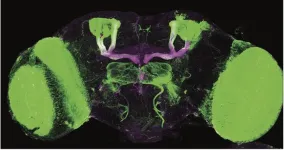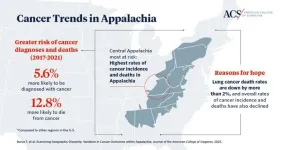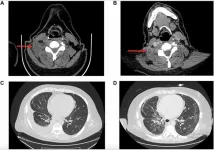(Press-News.org) Our immune system is armed with an array of defenses designed to detect and eliminate harmful threats. One of its most powerful defense mechanisms is the complement system—a group of proteins that patrols our body, ever vigilant for signs of infection or injury. Now, over 100 years after the complement system was first described, researchers at Mass General Brigham have discovered that a protein known as granzyme K (GZMK) drives tissue damage and inflammation by activating the complement system against our own tissues. Their findings not only reshape the century-old understanding of the complement system but also open new avenues for therapies that could specifically block this harmful pathway in patients with autoimmune and inflammatory diseases. Results are published in Nature.
“Our discovery of a new way of activating the complement system, driven by an enzyme produced by cells that are abundant in inflamed tissues, has important clinical implications,” said lead author Carlos A. Donado, PhD, Instructor in Medicine at Harvard Medical School and a postdoctoral fellow in the Brenner lab in the Division of Rheumatology, Inflammation, and Immunity at Brigham and Women’s Hospital, a founding member of the Mass General Brigham healthcare system. “Our work highlights GZMK as a promising therapeutic target to inhibit complement activation across multiple diseases. Unlike traditional therapies that broadly inhibit complement activation, hitting this target could preserve the anti-microbial functions of complement, while specifically inhibiting this harmful pathway in chronically inflamed tissues.”
The work, carried out in the laboratory of Michael Brenner, MD the E.F. Brigham Professor of Medicine at Harvard Medical School, was driven by a compelling observation the Brenner group had made earlier: the majority of CD8+ T cells in the inflamed synovium of rheumatoid arthritis patients—and in affected organs across various inflammatory diseases—produce GZMK, a protein that had an unclear function. Intriguingly, other research groups have also found this same population of cells to be highly enriched in the diseased tissues of patients with neurodegenerative and cardiovascular diseases, cancer, and even in aging individuals. Given their widespread abundance in inflamed tissues, the research team suspected that these cells—and GZMK—might play a fundamental role in driving inflammatory tissue damage.
To explore this, they analyzed the protein sequence of GZMK and compared it to other human proteins to find clues about its function. Through a series of experiments, they demonstrated that GZMK activated the entire complement cascade, producing complexities that drive inflammation, recruit immune cells, and cause tissue damage.
Their research further revealed that in human rheumatoid arthritis synovium, GZMK is enriched in regions exhibiting abundant complement activation. In two independent animal models of rheumatoid arthritis and psoriasiform dermatitis, mice with a genetic deficiency in GZMK were significantly protected from disease—exhibiting reduced arthritis, dermatitis, and complement activation—compared to mice with normal GZMK expression. “These findings underscore the pivotal role of GZMK-mediated complement activation in driving disease and highlight the broad translational potential of targeting this pathway across multiple disease states” said co-lead author Erin Theisen, MD PhD.
“Our findings provide new insights into how chronic inflammation might be triggered and sustained in autoimmune and inflammatory diseases,” said senior author Michael B. Brenner, MD. “Moving forward, we will continue to investigate the impact of this pathway across various diseases and are actively working on developing inhibitors to target GZMK, with the hope of offering new, targeted treatments for patients suffering from autoimmune and inflammatory conditions.”
Authorship: In addition to Donado, Theisen and Brenner, Mass General Brigham authors include Aparna Nathan, Karishma Vijay Rupani, Dominique Jones, Madison L. Fairfield, Soumya Raychaudhuri, and co-senior author A. Helena Jonsson. Additional authors include Fan Zhang, Kellsey P. Johannes, Accelerating Medicines Partnership RA/SLE Network, and Daniel F. Dwyer.
Disclosures: Brenner is a consultant to GSK, Moderna, AbbVie, Third Rock Ventures, 4FO Ventures and consultant to and founder of Mestag Therapeutics. Raychaudhuri is a founder of Mestag Therapeutics, a scientific advisor for Janssen and Pfizer, and a consultant to Gilead and Rheos Medicine. Dwyeris a consultant to Celldex Therapeutics.
Funding: This work was supported by US NIH (R01 AR073290, R01 AR081792, 5T32AR007098-48), Rheumatology Research Foundation grant (889234), NIAMS (K08 AR081412), Rheumatology Research Foundation Investigator Award, and the Dermatology Foundation Career Development Award.
This work was supported by the Accelerating Medicines Partnership® Rheumatoid Arthritis and Systemic Lupus Erythematosus (AMP® RA/SLE) Network (AMP) in Rheumatoid Arthritis and Lupus Network. AMP is a public-private partnership (AbbVie Inc., Arthritis Foundation, Bristol-Myers Squibb Company, Foundation for the National Institutes of Health, GlaxoSmithKline, Janssen Research and Development, LLC, Lupus Foundation of America, Lupus Research Alliance, Merck & Co., Inc. Sharp & Dohme Corp., National Institute of Allergy and Infectious Diseases, National Institute of Arthritis and Musculoskeletal and Skin Diseases, Pfizer Inc., Rheumatology Research Foundation, Sanofi and Takeda Pharmaceuticals International, Inc.) created to develop new ways of identifying and validating promising biological targets for diagnostics and drug development Funding was provided through grants from the National 1241 Institutes of Health (UH2-AR067676, UH2-AR067677, UH2-AR067679, UH2-AR067681, UH2-1242 AR067685, UH2- AR067688, UH2-AR067689, UH2-AR067690, UH2-AR067691, UH2-1243 AR067694, and UM2- AR067678).
Paper cited: Donado CA et al. “Granzyme K activates the entire complement pathway” Nature DOI: 10.1038/s41586-025-08713-9
For Related Information:
Researchers Receive Brigham Ignite Awards for Projects on Breast Reconstruction and Rheumatoid Arthritis Treatment
###
About Mass General Brigham
Mass General Brigham is an integrated academic health care system, uniting great minds to solve the hardest problems in medicine for our communities and the world. Mass General Brigham connects a full continuum of care across a system of academic medical centers, community and specialty hospitals, a health insurance plan, physician networks, community health centers, home care, and long-term care services. Mass General Brigham is a nonprofit organization committed to patient care, research, teaching, and service to the community. In addition, Mass General Brigham is one of the nation’s leading biomedical research organizations with several Harvard Medical School teaching hospitals. For more information, please visit massgeneralbrigham.org.
END
Alcohol use disorder, which affects over 10% of Americans, can lead to persistent and serious insomnia. Difficulties falling asleep and staying asleep can last even after months of sobriety, increasing the risk of relapse. But treating withdrawal-related insomnia is difficult, partly because what’s going on in the brain in this condition remains largely mysterious.
Now, research in fruit flies has identified specific brain signals and groups of brain cells that are involved in alcohol-induced insomnia. This work could ultimately lead ...
Key Takeaways:
Appalachia is not uniform: There are important distinctions in cancer diagnoses and deaths among different regions of Appalachia, with certain areas of Central Appalachia experiencing the highest rates of cancer incidence and deaths among the greater Appalachian region.
Higher death rates from cancers that can be caught early with screening: Although the region has improved in screening rates, people in Appalachia still die more frequently from cancers that can be caught early with routine screening than elsewhere in the United States.
Reason for hope: Research can pave the way for targeted interventions that can reduce these ...
LOS ANGELES — Why do some people who consume a few glasses of alcohol a day develop advanced liver disease while others who drink the same amount don’t?
The answer may lie in three common underlying medical conditions, according to a new study published in Clinical Gastroenterology and Hepatology from Keck Medicine of USC. The research found that heavy drinkers with either diabetes, high blood pressure or a high waist circumference are as much as 2.4 times more likely to develop advanced liver disease.
“The results ...
ROCHESTER, Minnesota — Mayo Clinic researchers have pioneered an artificial intelligence (AI) tool, called OmicsFootPrint, that helps convert vast amounts of complex biological data into two-dimensional circular images. The details of the tool are published in a study in Nucleic Acids Research.
Omics is the study of genes, proteins and other molecular data to help uncover how the body functions and how diseases develop. By mapping this data, the OmicsFootPrint may provide clinicians and researchers with a new way to visualize ...
“Here we present a case of a patient with stage IV CD-74-ROS1 fusion NSCLC discovered initially with RNA next generation sequencing (NGS) who acquired resistance to lorlatinib after 6 months on therapy through a novel RUFY1-RET fusion, detected only through RNA NGS.”
BUFFALO, NY - February 6, 2025 – A new case report was published in Volume 16 of Oncotarget on February 5, 2025, titled “Acquired RUFY1-RET rearrangement as a mechanism of resistance to lorlatinib in a patient with CD74-ROS1 rearranged non-small cell lung cancer: A case report."
In this case report, Jenny L. ...
WASHINGTON — Researchers have designed a single-photon time-of-flight LiDAR system that can acquire a high-resolution 3D image of an object or scene up to 1 kilometer away. The new system could help enhance security, monitoring, and remote sensing by enabling detailed imaging even in challenging environmental conditions or when objects are obscured by foliage or camouflage netting.
“Our system uses a single-photon detector approximately twice as efficient as detectors deployed in similar LiDAR systems ...
INDIANAPOLIS – Breast cancer is the world’s most prevalent cancer. Although earlier detection and targeted treatment have resulted in high survival rates, many breast cancer survivors experience fear of cancer recurrence. For some survivors this fear is occasional, for others it is persistent and often debilitating.
A new study of breast cancer survivors has found this psychosocial challenge impacts almost every important domain of their lives – the emotional, behavioral, cognitive, relational and professional. A larger number of domains was affected, ...
Korea University Researchers Analysis of Income-Related Disparities in Mortality Among Young Adults with Diabetes
Type 2 diabetics (T2D) under 40 years of age with low income have a threefold higher risk of mortality
Young people with T2D are more affected by income than elderly people with T2D
The research team of Professor Sin Gon Kim and Professor Nam Hoon Kim of department of internal medicine (Endocrinology and Metabolism) of Korea University Anam Hospital, and Professor Ji Yoon Kim of Samsung Medical Center confirmed that young adults with T2D with low income have 3 times higher mortality ...
New research forthcoming in Social Psychological and Personality Science shows that when people understand how income inequality creates disparities in healthcare and education access, they become more likely to support policies addressing economic inequality.
Across four studies, the research shows that highlighting connections between income gaps and inequalities in health and education access decreases acceptance of economic disparities and increase support for redistributive actions.
"Research has shown that people often tolerate income inequality. However, our study shows that when people perceive ...
SCOTTSDALE, Ariz. — Feb. 6, 2025 — Michael S. Gordon, M.D., Chief Medical Officer of HonorHealth Research Institute, today was named a Fellow of the American Society of Clinical Oncology (FASCO), the world’s leading professional organization for physicians and oncology professionals caring for people with cancer.
“The title of FASCO is a recognition bestowed upon ASCO members who have shown extraordinary dedication for their voluntary efforts that benefit the Society, the specialty of oncology, and most importantly, the patients whom we serve,” according to a letter ...





